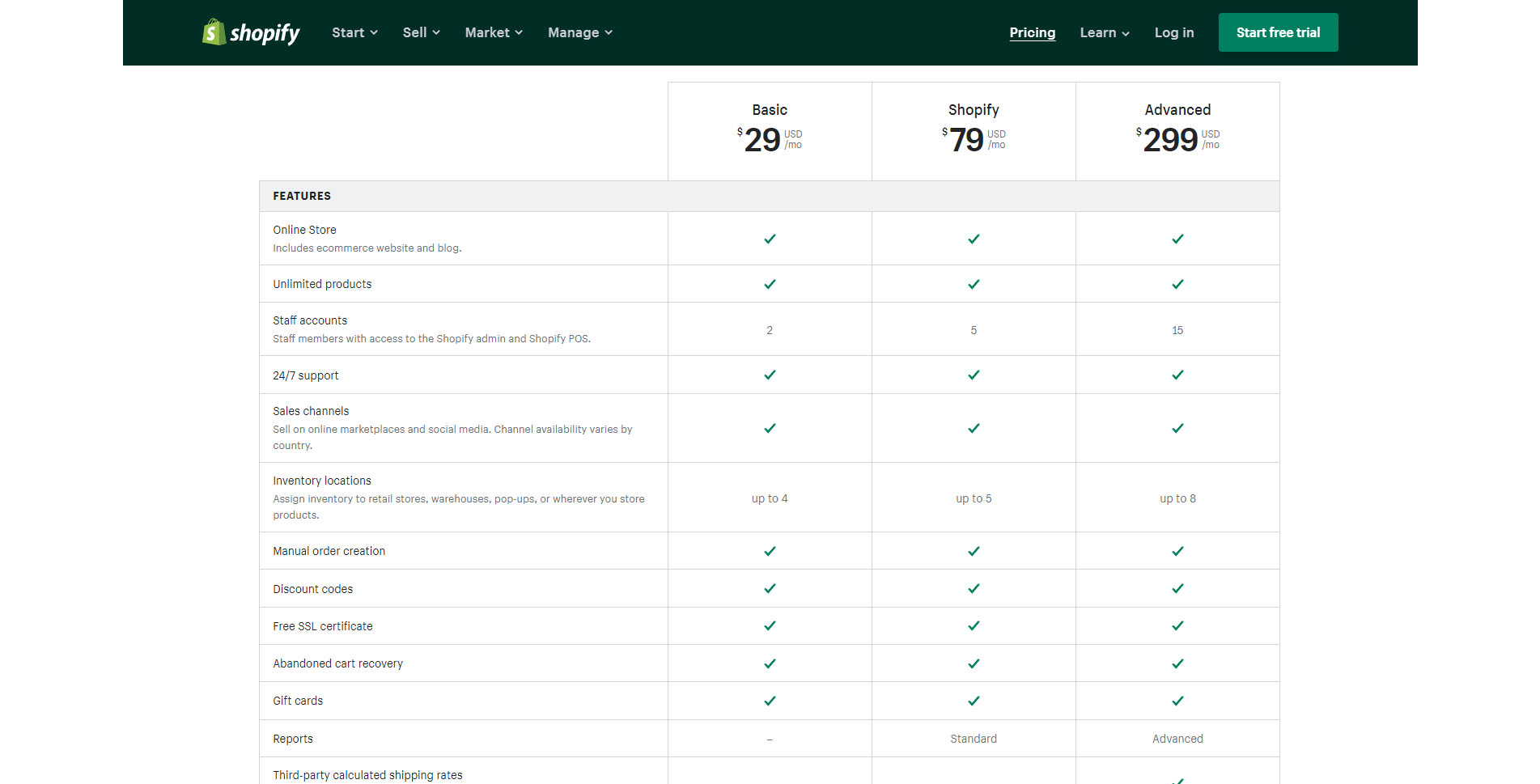In a nutshell, Shopify is an e-commerce software. It's a platform for starting and running a business, essentially an online store. Shopify is without a doubt the good online e-commerce platform for someone who wants to start a small business quickly. However, Shopify has significant drawbacks, such as the fact that most of the platform's add-ons are paid for on a monthly subscription basis. Startups that continue to grow will begin to face monthly fees just to maintain their website up and operating.
Here are some downsides of Shopify in comparison to a self-hosted bespoke e-commerce for expanding e-commerce firms.
Pricing:
Shopify offers a lot of free features, but if you want a fully functional website, you'll have to pay. The cheapest plan starts at $29 and goes up to $299, however for a developing business with one retail store, the $79/month plan is advised, as it includes 5 staff accounts, up to 5 locations, professional reports, and international domains and pricing, which are not included in the basic plan.
Packages like Shopify Lite, which costs $9 a month and allows you to add your products to any blog or website and accept credit card payments, are also available.

As a result, the most cost-effective approach to run a business is to combine the basic plan with Shopify Lite. Large firms with huge sales volumes are obliged to pay for more expensive packages, as well as the Shopify Plus plan, which provides enterprise-grade solutions.
Remember that to boost the functionality and exposure of your eCommerce business, you may need to pay for themes and plugins available on the Shopify App Store or those sold by third-parties. These charges, when added together, might have an impact on your profitability, especially if you're a startup.
The more you expand, the more help you'll need to keep your website up to date. You may either hire someone to assist you with this or pay the Shopify team $55 per hour for their services.
Customization:
Another disadvantage of utilising Shopify for your eCommerce store is that its themes must be altered using the Shopify Liquid setup, which may be too complicated for inexperienced developers.
Many web designers and developers are familiar with PHP, which is a tool used by WordPress for theme and template customization. First-timers, on the other hand, may struggle with Shopify's customising options. Furthermore, all Shopify stores have a similar style and feel, making it difficult for them to differentiate themselves from competition.
Poor CMS:
Content marketing is a great way to promote your eCommerce store. Not only can you expand your brand and educate your clients, but you can also enhance organic traffic and social shares.
Shopify's Content Management System (or CMS) prevents business owners from publishing rich content such as blogs or vlogs. Despite the fact that it has its own blogging platform, it isn't the best. It may do the job, but it clearly needs to be better. Furthermore, exporting blog posts from Shopify is not a pleasant experience.
Because Shopify's blog layouts are limited, you'll have to create something unique on another blogging platform, such as Tumblr, and then host it on blog.yoursite.com.
This might be a problem for business owners who wish to use content to market their products.
A good CMS is therefore critical to ensure effective marketing for your eCommerce website especially if content is your go-to marketing strategy.
You’re locked into their terms for a long period:
There isn't much that can be done in the short term if price or subscription models shift. You can cancel your subscription at any time, but you will lose access to your website. You might want to consider hosting your own website to combat this.
Shopify is not the best tool to use for scaling a business:
Simply put, Shopify can't handle a huge number of consumers or a wide variety of products. Shopify is unable to assist with large-scale stock and exchange concerns that may occur in huge businesses.
Search and filter mechanism:
At this point, it isn't working properly. The majority of Shopify store owners are unhappy with the search solution that comes standard with the basic Shopify edition.
No HTML or CMS Access:
Another disadvantage of a hosted platform is that you will not have access to the code. This can be restrictive because it means you'll have to add elements to your site through the Shopify dashboard every time.
No Custom URL:
Another drawback of Shopify is that consumers are unable to modify the URL of their website, which can be troublesome when rebranding or creating a more significant web address. There is no way to change this information after a store is put up, and it becomes part of their brand's web appearance.
Overall, Shopify is a fantastic ecommerce platform for anyone searching for a simple to use platform that doesn't require coding knowledge. Because of its accessibility, speed, and security, Shopify deserves to be at the top of the eCommerce platform hierarchy. When you decide to add new services or upgrade your package, things become more complicated and pricey. Shopify is not the ideal option for your business if you have a little more ecommerce experience and want more freedom. When you use a self-hosted solution, you'll have superior customer data access and backend access.
If you're looking to start up an eCommerce store or already have one and want to improve it, feel free to contact Accrete Infotech, as it is the best-in-class provider of eCommerce solutions.



